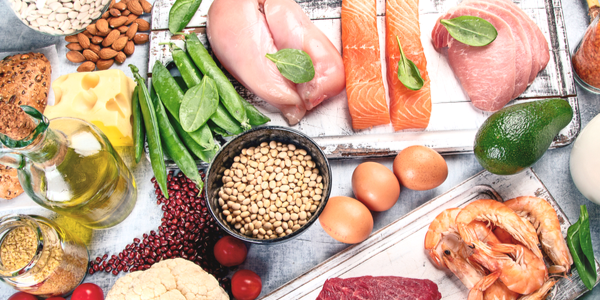
Out of the three macronutrients (protein, carbs, and fat), protein is generally the least vilified. Known for its role in muscular growth and weight loss, protein is touted and often recommended in high quantities.
After all, if a high-protein diet is good, then more is better… Right?
Like most nutritional concepts, it is hardly that straightforward. And, in fact, one can potentially eat too much protein.
So how much protein is too much? Let's take a look!
The Role of Protein
The word protein is derived from the Greek word proteos, referring to primary or first place, inferring that it is perhaps the most important macronutrient in terms of good health. While all the macronutrients are vital for health, protein exerts more functions within the body than carbs or fat, though the latter is a close second.
Proteins consist of amino acids or in other words building blocks that link together to form long chains. There are 20 amino acids that help create thousands of proteins, of which 11 are nonessential and 9 are essential.
Nonessential refers to amino acids that can be naturally formed by the body, while essential ones must be obtained by diet. However, some nonessential amino acids become conditionally essential in certain situations like sickness or injury.
The main functions of protein include:
1. Act as enzymes to trigger many biochemical reactions like digestion, muscle contraction, and blood clotting
2. Act as hormones: chemical messengers that communicate between cells, tissues, and organs
3. Growth, maintenance, and repair of tissues, especially after injury or sickness
4. Provide structure (fibrous proteins called keratin, collagen, and elastin)
5. Maintain fluid balance (albumin and globulin)
6. Transport and store nutrients like vitamins, minerals, glucose, cholesterol, and oxygen
7. Form immunoglobulins (antibodies) to bolster the immune system
8. Balance Proper pH (the concentrations of acids versus bases)
9. Provide energy only if carbohydrate or fat stores are insufficient
Protein Recommendations
Here is where things get controversial…
The Recommended Dietary Allowance (RDA) for protein is only 0.8 grams per kilogram of body weight, where the RDA stands for the minimum amount of a nutrient one needs to maintain health. For example, a 150 lb (68.2 kg) person would need about 55 grams of protein per day.
The current RDA guidelines for protein only provide about 10 percent of total calories from protein. If a moderately high-fat diet is considered 30 percent of total calories, this leaves about 60 percent coming from carbs. (And likely not very healthy for the majority of Americans who consume low-quality carbohydrates.)
On the other hand, the Academy of Nutrition and Dietetics guidelines promote 15 to 25 percent of total daily intake from protein calories.
Nowadays, protein recommendations range anywhere from 0.6 to 2.0 grams per kilogram (g/kg) body weight. The lower end is recommended for people with end-stage renal disease while the higher recommendations are usually reserved for athletes. Nonetheless, many health professionals consider a range of 1.0 to -1.2 g/kg body weight as healthy.
And like carbohydrates, well-informed health professionals urge people to focus on the quality of their protein sources even more so than the amount of protein one consumes.
Is Too Much Protein Bad For You?
Technically, yes, too much protein can be detrimental, as is the case with almost all nutrients. The main concern with too high of a protein diet concerns the kidneys, bones, and heart.
Kidney Function
The body breaks down protein into their individual building blocks, amino acids, which naturally produce ammonia as a byproduct. In people with healthy kidney function, this organ is able to convert it into urea with the help of the liver and excrete it through the urine.
A very high-protein diet causes kidney function to decline is a common myth, and no research demonstrates this. Rather, people with decreased kidney function, like those with renal disease, cannot tolerate high-protein diets because they cannot excrete enough ammonia naturally.
Finally, people consuming high-protein diets still have a higher risk of kidney stones, but this can be mitigated through other healthful habits.
Heart Concerns
Secondly, some people think that high-protein diets increase the risk of heart disease. However, once again, research does not demonstrate this notion.
In fact, more research suggests high-protein diets help promote healthy weight, decrease blood pressure, decrease visceral fat around the belly, balance blood sugar and increase good HDL cholesterol. But some studies differentiate between the types of protein consumed, once again suggesting that the quality of the source matters.
In general, lean, skinless, grass-fed, organic, hormone and antibiotic-free meats and poultry, wild-caught seafood, beans and legumes, and dairy foods like Greek yogurt pose little risk to health.
Bone Health
Over one-third of bone mass is made of protein. And, interestingly, older studies suggested high protein diets could lead to low bone mineral density.
Alas, newer studies show that higher-protein diets may be beneficial for bone health. One review of 13 studies determined that higher protein intake above the RDA was significantly correlated with reduced risk of hip fractures and increased bone mineral density.
Other reviews of studies show similar findings. In fact, the European Society for Clinical and Economic Aspects of Osteoporosis and Osteoarthritis recommends a higher intake of 1.0 to 1.2 grams of protein per kg of body weight to promote better bone health.
Cancer
Finally, there has been some talk of high protein diets and their link to certain cancers, notably breast, esophageal, colorectal, prostate and ovarian. Yet, most scientific research shows no association between these variables and even claims that higher protein intake promotes better survival rates in women with breast cancer.
Nonetheless, specific sources of protein may increase cancer risk, but this is likely unrelated to the protein content per say. The risk might be related to the other compounds that the high protein foods contain such as nitrates or saturated fats in red meat and preservatives and additives in poultry and seafood.
Thus, it is prudent to focus on consuming high-quality sources of protein and to include plenty of plant-based proteins like beans, legumes, nuts, and seeds in addition to animal forms. The overall quality and nutrient density of a diet are much more important than perfecting an exact macronutrient composition.
Signs and Symptoms of Too Much Protein
First of all, most people will not experience any signs or symptoms of eating too much protein, mostly because it is very hard to overconsume this macronutrient.
Generally, people can consume up to 2.0 g/kg of body weight without any adverse side effects. Furthermore, some elite athletes can consume up to 3.5 g/kg of body weight without symptoms.
Nonetheless, the side effects associated with eating too much extra protein include:
1. Stomach aches and indigestion
2. Dehydration
3. Unexplained exhaustion
4. Nausea
5. Irritability
6. Headaches and migraines
7. Diarrhea
In the most extreme cases, someone may experience:
1. Seizures
2. Coma
3. Blood vessel disorders
4. Liver and kidney injury
5. Death
Some populations are at higher risk of developing symptoms from a high-protein diet, mostly because of how their health condition affects digestion. These include those with:
• Kidney and liver conditions
• Eating disorders/starvation
• Very low carbohydrate intake (less than 5 percent of total calories)
• Gout
• Nutrient deficiencies (glucose, arginine, glutamine, vitamins B6 and B12, and folate)
In Summary
Based on the available research, protein still reigns as the most important macronutrient. Protein offers many health benefits like healthy weight maintenance, muscle growth, tissue repair, improved satiety, reduced sugar cravings, and much more.
High-protein diets have previously been associated with kidney, heart, bone, and cancer concerns. However, research does not show these correlations and, oftentimes, higher protein intake was protective against these diseases.
Thus, it is likely healthy for those without kidney disease, liver problems, and eating disorders that cause nutrient deficiencies and starvation to consume up to 2.0 g/kg body weight. It’s best to consult a professional (even if an athlete) if planning to consume greater amounts to ensure safety.
References:
Kubala J. Are There Dangers to Eating Too Much Protein? Healthline. Published February 1, 2021. www.healthline.com/nutrition/too-much-protein.
Marengo K. How Do You Know If You Are Eating Too Much Protein? Medical News Today. Published August 21, 2018. www.medicalnewstoday.com/articles/322825#recommended-intake.
Pendick D. How Much Protein Do You Need Every Day? Harvard Health. Published June 21, 2019. www.health.harvard.edu/blog/how-much-protein-do-you-need-every-day-201506188096.
Walle G. 9 Important Functions of Protein in Your Body. Healthline. Published June 20, 2018. www.healthline.com/nutrition/functions-of-protein.
When It Comes to Protein, How Much Is Too Much? Harvard Health. Published March 30, 2020. www.health.harvard.edu/nutrition/when-it-comes-to-protein-how-much-is-too-much.







